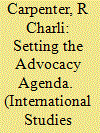| Srl | Item |
| 1 |
ID:
071593


|
|
|
|
|
| Publication |
2006.
|
| Summary/Abstract |
While gender-based violence has recently emerged as a salient topic in the human security community, it has been framed principally with respect to violence against women and girls, particularly sexual violence. In this article, I argue that gender-based violence against men (including sexual violence, forced conscription, and sex-selective massacre) must be recognized as such, condemned, and addressed by civilian protection agencies and proponents of a 'human security' agenda in international relations. Men deserve protection against these abuses in their own right; moreover, addressing gender-based violence against women and girls in conflict situations is inseparable from addressing the forms of violence to which civilian men are specifically vulnerable.
|
|
|
|
|
|
|
|
|
|
|
|
|
|
|
|
| 2 |
ID:
076508


|
|
|
| 3 |
ID:
102540


|
|
|
|
|
| Publication |
2011.
|
| Summary/Abstract |
While a number of significant campaigns since the early 1990s have resulted in bans of particular weapons, at least as many equivalent systems have gone unscrutinized and uncondemned by transnational campaigners. How can this variation be explained? Focusing on the issue area of arms control advocacy, this article argues that an important influence on the advocacy agenda within transnational networks is the decision-making process not of norm entrepreneurs nor of states but of highly connected organizations within a given network. The argument is illustrated through a comparison between existing norms against landmines and blinding laser weapons, and the absence of serious current consideration of such norms against depleted uranium and autonomous weapons. Thus, the process of organizational issue selection within nongovernmental organizations (NGOs) and international organizations (IOs) most central to particular advocacy networks, rather than the existence of transnational networks around an issue per se, should be a closer focus of attention for scholars interested in norm creation in world politics.
|
|
|
|
|
|
|
|
|
|
|
|
|
|
|
|